

Organic Management of Late Blight of Potato and Tomato with Copper Products. Alex Stone, Oregon State University Brian Baker, Organic Materials Review Institute Excerpts from: Brown Rosen, E., E.
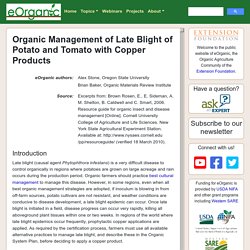
Sideman, A. M. Shelton, B. Introduction Late blight (causal agent Phytophthora infestans) is a very difficult disease to control organically in regions where potatoes are grown on large acreage and rain occurs during the production period. "Copper fungicides are estimated to extend the growing period (before the potato foliage has to be destroyed to prevent the spread of blight to the tubers and neighbouring fields) by between 2-4 weeks. Use on organic farms Copper fungicides are on the National Organic Program National List as synthetics. Why People Oppose GMOs Even Though Science Says They Are Safe. Genetically modified organisms (GMOs) have met with enormous public opposition over the past two decades.
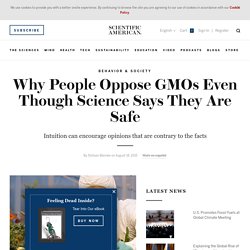
Many people believe that GMOs are bad for their health – even poisonous – and that they damage the environment. This is in spite of overwhelming scientific evidence that proves that GMOs are safe to eat, and that they bring environmental benefits by making agriculture more sustainable. Why is there such a discrepancy between what the science tells us about GMOs, and what people think? To be sure, some concerns, such as herbicide resistance in weeds and the involvement of multinationals, are not without basis, but they are not specific to GMOs. Hence, another question we need to answer is why these arguments become more salient in the context of GMOs. In the paper, we identify several intuitions that may affect people’s perception of GMOs.
Essentialism clearly plays a role in public attitudes towards GMOs. GMOAnswers - Your Questions on Health and Safety of GM Food and Crops. Non-browning genetically engineered ‘Arctic apples’ now on sale. Nobelists To Greenpeace: Drop Your Anti-Science Anti-GMO Campaign. Glyphosate: WHO cancer agency edited out "non-carcinogenic" findings. Arctic golden delicious: Non-browning genetically engineered apples debut in Midwest grocery stores.
Psmag. Americans with low levels of science knowledge are more likely to mistrust food additives and genetically modified foods, according to a new survey from the Pew Research Center.
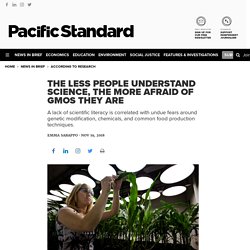
This is one of a few major takeaways from the report, which surveys Americans' attitudes toward the risks certain foods pose. The researchers estimate that about half the country feels that food additives pose a serious risk to health over time (51 percent) and a similar number feels that genetically modified food is worse for health (49 percent). Unsurprisingly, people's food ideologies—their feelings about what foods are good and bad and what food can do to or for a person—inform their feelings about genetically modified food and food additives, as well as their thoughts on diet and health. Across the board, however, women are slightly more likely to mistrust additives and genetic modification in food. Kenya approves field trials for disease-resistant GMO bananas.
Monsanto Is Going Organic in a Quest for the Perfect Veggie. Organic fungicide copper sulfate poses dangers to humans, animals, insects—how does it compare to conventional pesticides? Skip to content The GLP is committed to full transparency.
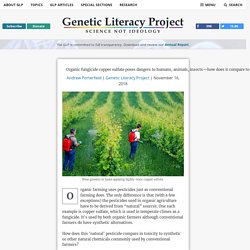
Download and review our Annual Report. Organic fungicide copper sulfate poses dangers to humans, animals, insects—how does it compare to conventional pesticides? Andrew Porterfield | Genetic Literacy Project | November 16, 2018 Organic farming uses pesticides just as conventional farming does. How does this ‘natural’ pesticide compare in toxicity to synthetic or other natural chemicals commonly used by conventional farmers? Many anti-GMO activists have pointed to pesticides used in conventional agriculture, such as the herbicides glyphosate and the highly toxic organic 2,4-D, as dangerous to people, animals and the environment.
MTHFR gene and vaccines – what are the facts and myths. We call them zombie vaccine tropes, beliefs of the anti-vaccine world that keep reinventing themselves and come back alive, despite being dismembered by skeptics and scientists all of the world.
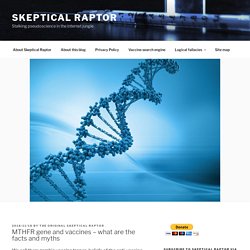
One of the most annoying zombie tropes has been the MTHFR gene and vaccines – the trope states that it’s dangerous to vaccinate a child with the MTHFR gene mutation, which really isn’t supported by scientific evidence. I never know what causes trope to start, and why it returns from the dead, but MTHFR gene and vaccines seem to be one of them. Let’s take a look at the MTHFR gene, and why there might be an issue with vaccines. What is this MTHFR gene? Time for a little science – more like a lot of science. Percy Schmeiser vs Monsanto. It's the familiar tale of David vs Goliath: a small, independent farmer, struggling to make ends meet, gets sued by a gigantic multinational megacorporation.

He heroically fights back as best he can with his limited resources, but inevitably cannot prevail. This basic plot is one that's emotionally appealing at multiple levels, and it's one that we've seen repeated throughout the history of storytelling ever since its Old Testament original. But in the case of the agricultural giant Monsanto suing farmers, the story brings an additional appeal: that of evil technology profaning and polluting nature. It's little wonder that among nearly everyone who's heard of these lawsuits, Monsanto is considered the antagonist, and the small farmer is the virtuous and blameless victim. Myth #1: The GMO industry prevents farmers from using their own seeds When a farmer keeps the seeds from part of his crop, there's a lot wrong with them. Totally false.